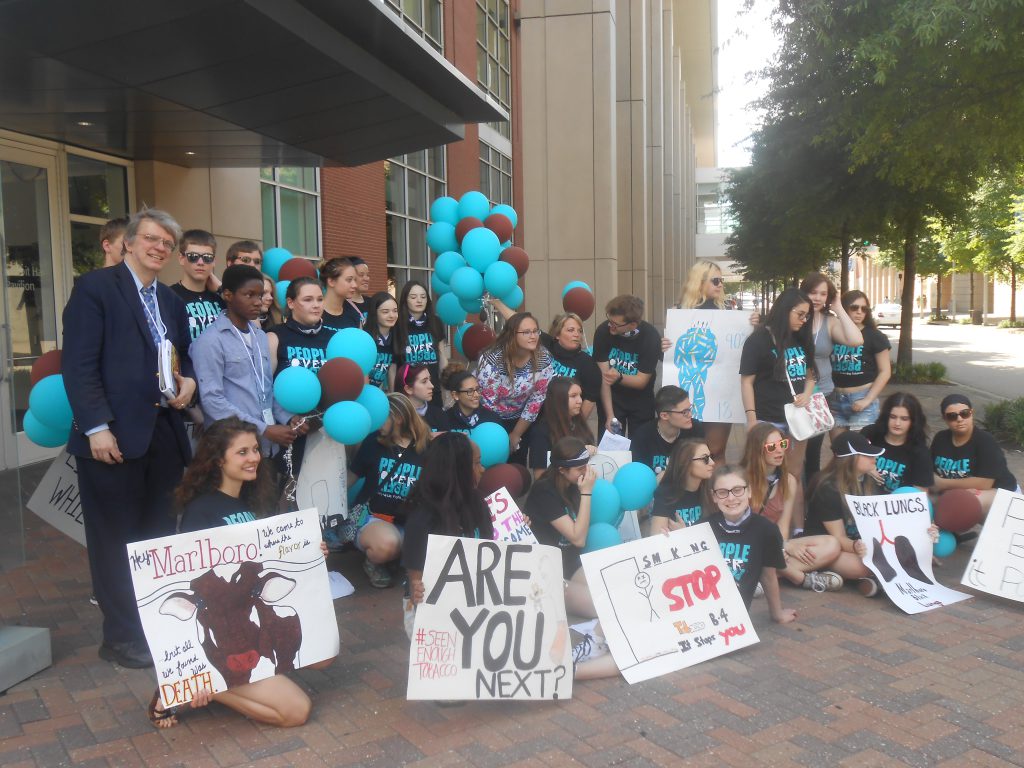By Edward L. Sweda, Jr., PHAI Senior Attorney
As I approached the Greater Richmond Convention Center on the partly cloudy morning of Thursday, May 18, 2017, thoughts of sub-freezing temperatures and snowstorms never entered my mind. But, before the morning gave way to the afternoon, I realized that I had just seen dozens of snowflakes.
As he opened the meeting just before 9:00 A.M., Altria Group Chairman, President and CEO Martin J. Barrington declared that the company had experienced “another outstanding year” in 2016. That was followed by a “solid start” in the first quarter of 2017. He listed four priorities for the company:
- Tobacco Harm Reduction;
- Marketing;
- Supply Chain Responsibility; and
- Employees.
The company’s strategies are:
- Maximize income from core tobacco businesses over the long term;
- Grow new streams with innovative tobacco products (including MarkTen XL, the “fastest growing e-vapor brand” in the last quarter of 2016); and
- Manage diverse income streams and a strong balance sheet to deliver consistent financial performance (citing Altria’s ownership of over 10% of AB InBev and its Ste. Michelle Wine Estates ).
I was able to begin the Question and Answer session of the meeting with the following question:
“You and other executives of Altria Group have often referred to tobacco litigation as an issue that is ‘manageable’ and, therefore, should not be troubling to investors.
Yet, just within the past two months, the following developments have occurred:
- On April 6th, the Florida Supreme Court in the R.J. Reynolds Tobacco Co. v. Marotta case ruled that federal law does not preempt Engle Progeny plaintiffs from bringing strict liability and negligence claims against tobacco companies.
- On April 12th in the Boatright v. Philip Morris USA, Inc. case, a Florida Appeals Court affirmed a jury award of $35 million against Philip Morris USA, Inc., and reversed the reduction of the award by the trial judge because the smoker was also at fault for his illnesses, ruling that Florida’s comparative fault law does not apply to intentional torts. This increases the company’s exposure to liability.
- On April 6th in the Sommers v. Philip Morris case, a Florida state jury awarded $1 million to the widow of a lawyer and real estate developer after finding Philip Morris responsible for his coronary artery diseases and fatal lung cancer.
My question is: do you understand why there are shareholders who believe that the tobacco litigation problem is no longer simply ‘manageable’?”
Mr. Barrington’s response was, while acknowledging these and other recent legal setbacks for Altria, to emphasize that in the larger picture, tobacco lawsuits are still “manageable” in the view of Altria’s management. He admitted that “litigation presents a risk and we devote substantial resources to it.” Mr. Barrington also claimed that the litigation has been “well managed” and that the slope of the numbers of cases “has been coming down.” Regarding Engle, he said that it presents a “complex set of individual cases” and that Altria is “working our way through it.” He complained that the “terms on which those cases are being tried are not particularly fair to the defendants.” He concluded by stating that tobacco litigation is “a complex matter but it is a finite matter.”
Reality Check’s Jonathan Chaffe asked about the growing number of localities across the country that have adopted Age 21 policies – making it illegal to sell or give cigarettes and other tobacco products to people under age 21. Mr. Barrington responded by saying that he prefers to minimum age to be 18 rather than 21. He also raised the potential problem of communities that have passed Age 21 laws being surrounded by other communities that hadn’t, thus encouraging young smokers to travel to a place where the minimum age is still 18. Finally, he opined that it would be better to have this issue dealt with by Congress, rather than by states or localities.
A 15-year-old student from Elmira, New York asked Mr. Barrington what steps Altria is taking “to ensure that specific populations with higher smoking rates based on ethnicity, income, education and mental health are not being profiled by Altria’s advertising?” Altria’s current top executive gave an answer that any number of his predecessors have given over the years. He claimed that the company markets cigarettes “only to adults.”
In response to a question about how Altria plans to respond to the U.S. Department of Housing and Urban Development’s November 2016 policy for smoke-free public housing, Mr. Barrington said that Altria “hasn’t weighed in” on the issue but that, as a general rule, homeowners should decide whether to allow smoking in people’s homes.
A shareholder resolution, sponsored by the Sisters of St. Francis of Philadelphia (see http://osfphila.org/ ), called on the company to “voluntarily commit itself that, by August 15, 2017, it will not allow any images of its logo or products be placed anywhere outside any store, in store windows or anywhere else inside any store selling its tob acco products and will stop incentives to any retailer for such placements.” The proposal noted that “people of low socioeconomic status have higher rates of cigarette smoking than the general population” and that a city of Philadelphia analysis of licenses found that lower income zip codes “had two-thirds more tobacco retailers per capita than higher-income zip codes and three-quarters more within 1000 feet of a school.”
acco products and will stop incentives to any retailer for such placements.” The proposal noted that “people of low socioeconomic status have higher rates of cigarette smoking than the general population” and that a city of Philadelphia analysis of licenses found that lower income zip codes “had two-thirds more tobacco retailers per capita than higher-income zip codes and three-quarters more within 1000 feet of a school.”
The resolution received a 2.6% YES vote.
Before, during and after the meeting, at least thirty teenagers demonstrated outside the convention center, carrying teal and black balloons to emphasize how young people who begin using a deadly and addictive product become replacement smokers for Altria’s customers who die from smoking-caused diseases. The teenagers, who were accompanied be several adults, were representatives of Reality Check New York ) and No Limits Nebraska.

After the 50-minute meeting had ended, I emerged from the meeting room to learn that the approximately 85 attendees were blocked from exiting from the same doors through which they had entered an hour or so earlier. Instead, everyone had to walk down a long corridor – about the length of a city block – to get to the exit which led to the parking garage.
Why did Altria management take this action, which had never been done before in my experience of having attended annual shareholder meetings for more than 20 years?
If it hadn’t done so, shareholders would have seen dozens of teenagers wearing T-shirts with the message “People Over Profit.” They would have seen the balloons that represent both tobacco’s death toll and replacement toll. They would have heard the chants that describe the lies used by tobacco companies to help maximize profit levels at the expense of the health and the lives of the public.
In May 2016, the Urban Dictionary defined “snowflake” as “an overly sensitive person, incapable of dealing with any opinions that differ from their own.” The key message of this year’s Altria Group shareholders meeting was not that 2016 was an “outstanding” year for the company. It was that Altria’s management is afraid of opinions that differ from their own, especially when those opinions are espoused by young people who have the courage to speak truth to power – up close and personal.

